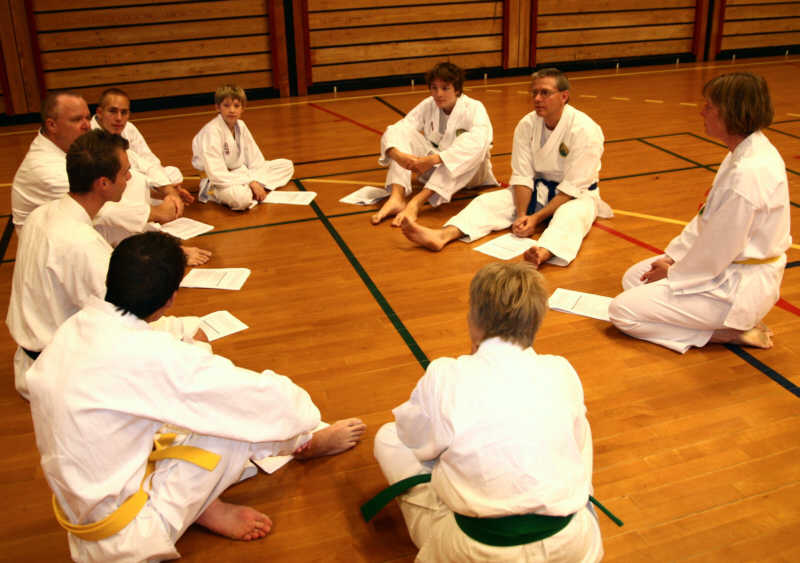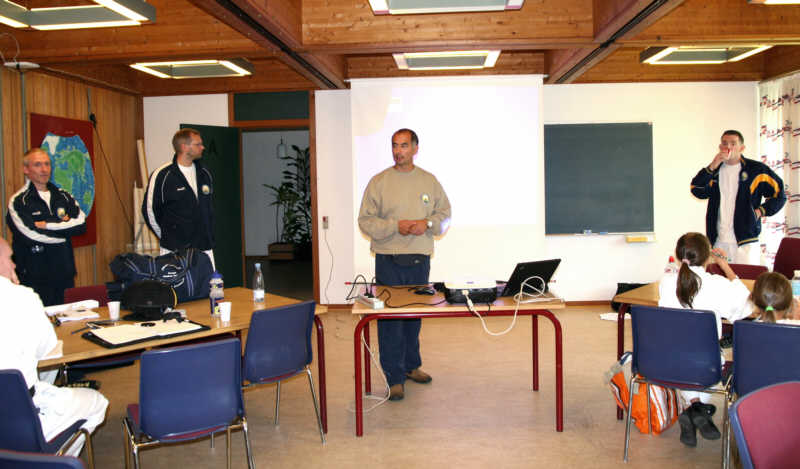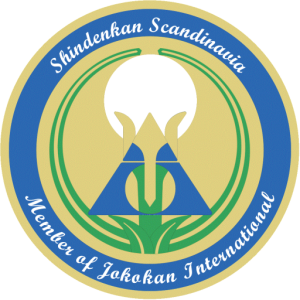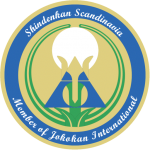By Jokokan Honbu
On Saturday 30 August 2008, the first instructor courses (I-K1 and I-K2) were completed with Half day and full day course.
Instructor course 1 was well attended with 51 participants and with 21 participants for the continuation on instructor course 2, which was a direct continuation of the basic course
Instructor course 1 is aimed at teaching 10-9.kyu and at the same time acts as a clarification course, which gives the participants a hands-on experience of whether the job of assistant instructor could be something for them. Instructor course 2 is aimed at teaching 10-7.kyu students, and functions as an extended course both on the practical part, but also on the communicative part, so assistant instructors can answer typical questions from the student target group through an increased understanding of functions and contexts system as organizational.
During the summer vacation, Kimu Sensei had designed the concept and "drawn the lines in the paintings", so that the three Honbu instructors for I-K1 and I-K2 could "paint the painting in the right colors", at the same time that Kimu Sensei through the month-long preparation process able to coordinate and ensure the common thread through both courses. The collaboration between I-K1 Honbu instructor, Jens Kyoshi, 6th dan and I-K2 honbu instructors, Søren and Martin Renshi-dai, 4th dan worked flawlessly and was further secured through the fact that both 4th dan acted as assistant instructors during the execution of the basic course.
Instructor course 1 has a weighting of 15 % in the classroom and 85 % practice in the dojo. The 51 students were divided into five teaching groups and were led through 4 cases, which were reinforced by various role-plays, all of which had their origin in real-life experiences. This could be further reinforced through the reserve of highly experienced 3-6.dan chief instructors, who through roles could reinforce the effect and learning in the various groups, who had to act in pairs as lead and assistant instructor during each case, with subsequent group evaluation and collection of course instructors.

Through role-playing, all participants could recognize the different roles, as the everyday situation in their respective schools, - and many had to admit that they met themselves. But throughout the course there was laughter and thoughtfulness to be felt and heard. Laughter is the liberating part and thoughtfulness the learning part - we think that at Shindenkan is a really good combination for the purpose.
After a break and lunch, 21 participants got started with I-K2.
Instructor course 2 has a weighting of 65 % in the classroom and 35 % practice in the dojo, and concluding with a written test where each student had to obtain at least 65 % correct answers to pass.
The practical part took place in the same accustomed way as during I-K1, but was further strengthened by the fact that the different roles now became supportive of each other and thus strengthened the effect.
With tea and coffee ad libitum on the tables, the dynamic teaching got under way in a meeting room. Here, history, development, organization and the systems were presented and countless questions answered, so that all assistant instructors can answer the most common questions from the target group of students and at the same time were encouraged to look for information themselves on Shindenkan's website, the internet, books etc.
I-K2 was then completed with a written test of approx. 30 minutes duration.
Kimu Sensei summarizes together with the course instructors the overall learning and realization from the day:
- Popularity - the reality is that some people like you and others don't, and you have to be clear about this in order to achieve your goals
- There can be a big difference between the business world and the Shindenkan association. In the business world, you have management and firing rights – you don't have that in a Shindenkan association. There is a big difference between tactical and strategic management of people, especially if this group is heterogeneous. Yakami Shinsei-ryu karate-do teaching is management, where you are on exam in every teaching lesson, feedback is immediate and only YOU are responsible. This is often different in the business world, "where there are several cooks who can spoil the food". Business life is most often focused on self-confidence. In Shindenkan, we begin to focus the building on self-confidence and gradually turn the focus to self-esteem. There is a big difference between tactical leadership from a leader with low self-esteem and high self-confidence, and on a leader with high self-esteem and high self-confidence, and what the organizational culture wants to promote; self-confidence versus self-esteem – the short versus the long horizon
- Cultural difference from regions and countries. Denmark is known for "Jantelov", "Aversion to authority figures", "Agreement is not necessarily an agreement", "If you stick a nail, knock it down", and that all the participants experienced this "Knowledge is power", Shindenkan tries to promote the freedom that Janteloven is gone and knowledge sharing is essential for development.
- Being on the other side of the table as an instructor, where you have to deliver the goods yourself and others have to receive, was an eye-opener for many, and many who thought this was a narrow matter had a sudden awakening, and others did much better than they themselves and others had ordered them to do – they broke the vicious circle and personal boundary which was very life-affirming.
The feedback from the courses was overwhelming and had absolutely scored top marks. With an effort of an average of 75 hours of work on each instructor course, it was a pleasure to receive the fine feedback about the benefits of the courses. Several management consultants and top managers acknowledged that they had learned more about themselves and others on these courses than they had on intensive and very expensive management courses at such well-known schools as INSEAD, IMD, CBS and other providers. We are quite grateful for that feedback!. Thanks.





